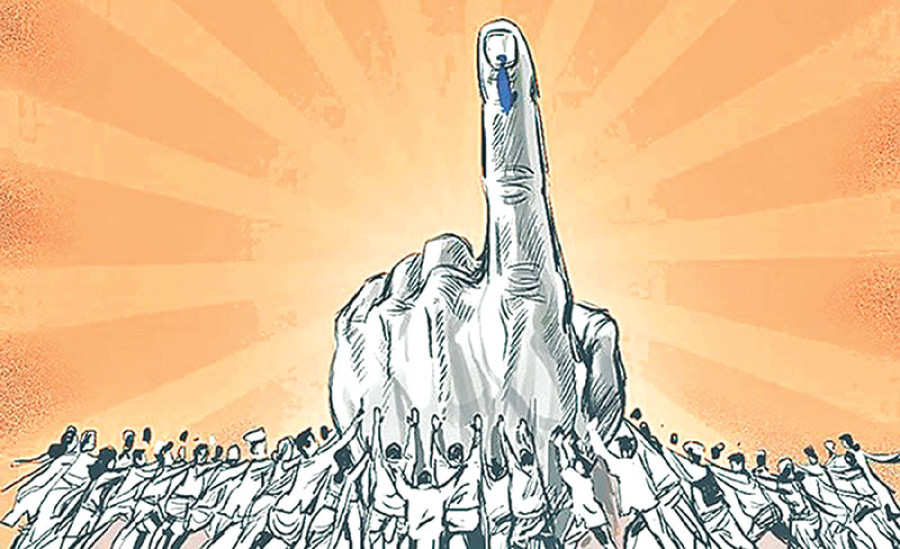Opinion
Strong leaders, weak democracies
Authoritarianism does not need a separate governing system; it can function equally well in a democracy
Amish Raj Mulmi
The Chinese purportedly have a saying: May you live in interesting times. It’s intended to be a curse, a ‘non-interesting time’ implying a time of relative peace and prosperity. But despite the saying’s apocryphal origins, the 21st century has indeed been a most interesting time. The end of Pax Americana is here, and a multipolar world led by China beckons us. Donald Trump is convinced American interests are best served by insularity rather than globalisation, a value the US state once championed. The US is instigating a trade war by raising tariffs on imports, contrary to the values of a globalised marketplace that it had long sold to the rest of the world as in their best interests, and other nations are hitting back.
Even as the US is turning inwards, what has been more shocking is the moral decline of the American nation under Trump, and the erosion of the liberal values it had long espoused. The US’s withdrawal from the UN Human Rights Council in the same week as the news of its immigration agents forcibly separating the children of illegal immigrants from their parents and keeping them in ‘tender-age shelters’ comes as the last nail in the coffin of American decline. Around 2,000 children have been separated from their parents as the Trump administration imposes stricter border controls in a new ‘zero tolerance policy’ that prosecutes adults who cross the US border for ‘any offenses’. Nearly 70 South Asians, including 18 illegal Nepali immigrants, have been detained under the new law. Trump has chosen to blame the Democrats even as he has backed down on the policy, but several news outlets have demolished his claims.
Only a few weeks ago, the possibility of peace in the Korean peninsula under Trump was not a figment of imagination. And yet, when Trump was asked about North Korean human rights abuses, he resorted to whataboutery of the worst sort: ‘Yeah, but so have a lot of other people have done some really bad things. I mean, I could go through a lot of nations where a lot of bad things were done.’
Here in Nepal
Trump’s attitude— – call it pragmatism, opportunism, or plain old apathy— – towards human rights has parallels in several other nations across the world, including our own. The notion of human rights now seems to be anathema to ruling authorities. As states turn more authoritarian, even within a democratic structure like ours, the key points that made a liberal world— – human rights, dissent and the freedom to express— – are now precious commodities. Governments are insisting on their right to oversee individuals, organisations and policies that do not serve their purposes, like the National Integrity Policy the Oli government wishes to impose in Nepal. Aimed at ‘promoting integrity and transparency’, it is quite clear the proposed directive is a backlash against agencies inimical to the government’s agenda. By arguing for ‘national interest’, and barring agencies or individuals from ‘levelling unwarranted charges against Nepal’, the Oli government has put up the facade of nationalism to block all criticism against the proposed directive.
But Prime Minister K.P. Oli doesn’t seem to want to stop at foreign agencies or individuals. His discomfort with human rights organisations has been apparent, as are his stands on ideas of inclusion, gender representation and minority rights. A new proposal now wants journalists to be accredited via a license. Last week, a report alleged government officials shut down the play Kora, based on the experiences of Tibetan refugees in Nepal and India, a week ahead of Oli’s visit to China. ‘Shilpee [Theatre] had initially green-signaled Kora, but felt the need to stop the play when an acquaintance from Ministry from Foreign Affairs called, saying that the Nepali government was resolute in the one China policy.’ The ministry has denied these allegations, but China’s sensitivity towards Tibetan affairs, and Nepal’s eagerness to please it, are indications enough.
These are warning signs for an illiberal state of affairs, especially when considered against the overwhelming majority enjoyed by this government. By shrouding its directives in the garb of nationalism, and by muzzling all talk of dissent in the name of national interest, the Oli government seems to be following in the footsteps of other authoritarian leaders from across the world. The liberal values of dissent, expression and rights are viewed as foreign imports, rather than essential to any society. That is concerning.
The decline of liberalism
Modern liberalism’s much-vaunted values were refined in the aftermath of the Second World War. The horrors of Nazism forced the world to adopt the Universal Declaration of Human Rights, which had its roots in the American constitution’s approach towards equal rights. In January 1941, before the US entered the Second World War, US President Franklin D. Roosevelt in his State of the Union address outlined four ‘essential human freedoms’: freedom of speech and expression; freedom of religion; freedom from want; and freedom from fear.
In the 21st century, however, the freedom from want— – i.e., a desire for economic gains— – has come to overshadow theothers. As our leaders make tall promises to lift us out of poverty (which we’ve already achieved to a reasonable level), we are ready to sacrifice a few freedoms for the sake of prosperity. We want our leaders to deliver— – and any other leeway we give them will be worth it simply because we want to grow richer. Our leaders have made our choice easier by presenting the alternative as antithetical to ‘national interests’, a phrase all authoritarians love.
This is the dilemma of the 21st century democracy. The democratic system is an unwanted child; massive electoral mandates allow leaders to relegate its values to a corner of the room without the tag of dictatorship. Liberal values are challenged on several grounds, chief among them that favouritism towards minorities has led to an overall decline in the welfare of the majority. The moral hypocrisies of a few are offered as absolute proof of liberal fault; when ad hominem arguments fail, whataboutery makes an appearance, as in Trump’s defence of North Korea vis-a-vis human rights.
But what has been more worrying is the co-option of institutions that allow democracy to foster, like a recent newspaper editorial that argued in favour of the National Integrity Policy. By arguing, ‘Those organizations who have stuck to these norms need not fear. Those who intend to work in dubious manner have no space in Nepal. Like everywhere else, the supremacy of the law of the land must prevail,’ the newspaper suggests laws have a moral authority and permanence to them.
They do not. Laws are made up and are often motivated by certain interests, but morality comes from a different place. If the ‘law of the land’ was to prevail, we’d still be under royal rule. The populist editorial holds up a more worrying sign to the rest of the country, that the liberal agenda is on the decline in today’s Nepal. That by itself is a sorry state of affairs, since it was in the defence of these very same values that the 2006 revolution was fought on our streets and with our blood.
Liberalism and modern democracy
The argument that freedom in society comes with its own set of responsibilities and hence, the need for oversight is utterly flawed. This is a myopic view that is based on opportunism; one cannot be liberal for a certain cause, and turn conservative for another, as easy as it may be. Such an instance is most often quoted in favour of banning hate speech. But consider this argument by British intellectual Kenan Malik: ‘The right to free speech only has political bite when we are forced to defend the rights of people with whose views we profoundly disagree.’
In other words, it is only when we defend the rights of those we consider contemptible that we learn what liberalism’s values stand for.
Authoritarianism does not need a non-democratic platform to foster. The facade of democracy is sufficient for several leaders in the modern world. The popular vote has given several leaders a writ that is pretty much absolute. As the Economist recently wrote, democracy is being dismantled in four stages: a ‘genuine popular grievance’ against liberal elites in power; the identification of an enemy to put the blame on; post electoral victories, the erosion of values such as free press and other democratic institutions like the justice system; and finally, the ‘death of democracy in all but name’.
The facade of nationalism allows such leaders to couch their agenda in the ‘national interest’. ‘[T]he people can always be brought to the bidding of the leaders. That is easy. All you have to do is tell them they are being attacked and denounce the pacifists for lack of patriotism and exposing the country to danger. It works the same way in any country.’
Hermann Goering said that in 1947. The first half of the 21st century is dangerously following a similar template.




 14.24°C Kathmandu
14.24°C Kathmandu











